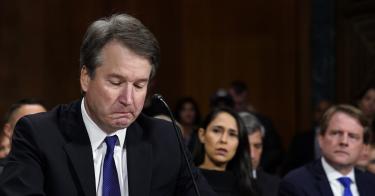Coming in to work today, the day of the Big Hearing, I turned on the radio to catch the 6:00 a.m. news. The first words I heard from Terry Moran were: “ABC News has been unable to corroborate the allegations.” Those few words speak volumes about the smear campaign against Supreme Court nominee Brett Kavanaugh.
Corroboration is essential for multiple reasons. First, like anyone else in this country, Kavanaugh is innocent until proven guilty. If you accuse someone of something, especially if it could harm them, you have to back it up.
The presumption of innocence is more than just a passing phrase in the occasional Law & Order episode. It is a foundational principle for any fair legal system — and for a decent society. An 1862 treatise on evidence, for example, says that the presumption of innocence is “grounded in reason and justice not less than in humanity.” It “must prevail until it be destroyed by such an overpowering amount of legal evidence of guilt as is calculated to produce the opposite believe.”
Courts have emphasized this over and over. More than a century ago, the Supreme Court said that the presumption of innocence “is the undoubted law, axiomatic and elementary, and its enforcement lies at the foundation of the administration of our criminal law.” In a 1970 case, the Supreme Court explained that “a society that values the good name and freedom of every individual should not condemn a man for commission of a crime when there is reasonable doubt about his guilt.” In a 1987 dissenting opinion, Justice Thurgood Marshall wrote that “at the end of the day, the presumption of innocence protects the innocent; the shortcuts we take with those whom be believe to be guilty injure only those wrongfully accused and, ultimately, ourselves.”
You get the point. The only reason to go over this is because some members of the United States Senate are so determined to defeat Kavanaugh’s nomination that they are willing to trash even this fundamental principle.
A second reason that corroboration is necessary is more practical. Kavanaugh has categorically denied all of the sexual-misconduct allegations against him. He has done so in letters and public statements; he has done so on television, and he will do again today to the Judiciary Committee. What most people probably don’t know, however, is that he has also denied these allegations to Judiciary Committee investigators where, if he lied, he faces the possibility of spending five years in prison.
The third reason for corroboration is that, while right now everyone is obsessed with what we do not know, these allegations are 100 percent contrary to what we do know about Brett Kavanaugh. This is, after all, the end of a nearly three-month confirmation process. Truckloads of information has been studied, his entire life has been reviewed and investigated. Good grief, the media even grilled the bartender down the street from Kavanaugh’s house, hoping to pick up salacious gossip. Hundreds of people, including dozens and dozens of women, who have known him well for decades all say that the suggestion of such sexual misconduct is foreign to what is, in fact, known about this man.
It’s worth noting that the accusers themselves have failed to corroborate their own allegations. Dr. Christine Ford named three people who, she said, were at the party where she claims Kavanaugh assaulted her. Each of them, including Ford’s best friend, denies even being there.
The New Yorker and New York Times talked to dozens of people and failed to corroborate Deborah Ramirez’s allegations. According to The New Yorker, at least seven people Ramirez named as being at the party where, she said, Kavanaugh exposed himself deny any knowledge of it. And the Timeswrote that “Ramirez herself contacted former Yale classmates asking if they recalled the incident and told some of them that she could not be certain Mr. Kavanaugh was the one who exposed himself.”
And then there is Julie Swetnick who says that, as a college student, she attended “many parties” with high-schoolers and, on “numerous occasions” witnessed fondling, grabbing, grinding, drugging, and even gang-raping. Yesterday, 64 men and women who have known Kavanaugh since his high-school days responded in a letter to the Judiciary Committee that they “never witnessed any behavior that even approaches what is described in this allegation. . . . In the extensive amount of time we collectively spent with Brett, we do not recall having ever met someone named Julie Swetnick.”
The Judiciary Committee has, at least six different times, asked the lawyer who represents Swetnick for evidence, anything at all, that can corroborate Swetnick’s claims. He has produced nothing.
Which makes those words “ABC News has been unable to corroborate the allegations” not surprising at all.
This piece originally appeared in the National Review on 9/27/18



